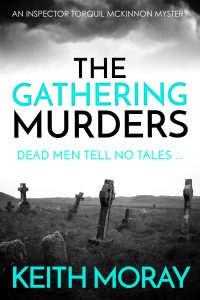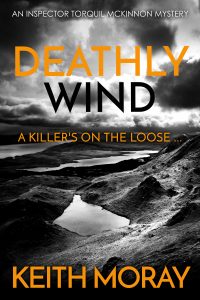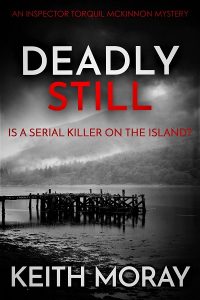Hi Keith. Welcome to the Sapere Books blog!
Can you tell us a little bit about what first inspired you to write the Torquil McKinnon Investigations?
Well, I have been a crime fiction reader most of my life and always wanted to be a crime writer. I began writing children’s stories for The People’s Friend when I was a medical student at the University of Dundee. Then when I qualified, I wrote for the Kingston-upon-Hull’s dial-a-bedtime story service, until I had to give it up and focus on my medical practice. One of my forebears was a piper, and I thought that if I ever did write a crime novel it would have a piper in it. The germ of an idea was there.
A few years later I started having bagpipe lessons from a good friend and golf partner, who happened to be a retired pipe major. So, actually playing the pipes seemed to germinate the idea. Then we went on a family holiday to Tobermory in Mull and the whole thing seemed to unfold before me. A remote Outer Hebridean island with a primitive golf course and the smallest police force in the country, the Hebridean Constabulary. The ingredients were there, it just took a visit to a Highland Gathering on the mainland and I started to plot The Gathering Murders. The characters grew on me and the series just developed.
What was your reason for creating the fictional island of West Uist instead of choosing a real Scottish location?
I suppose I just fell into it. I had written several westerns long before I ever went to the USA, so I just started writing, amalgamating my own memories into my own wee island in much the same way that I had created towns and counties in the Southwest of America. I wanted West Uist to be Scotland in miniature. This is why the terrain varies, there is a great variety of surnames (far greater than in the Outer Hebrides) and I have introduced a different theme with each novel.
What are your typical writing habits? Do you work on a set schedule each day? Do you plan thoroughly before you begin writing?
 I am an opportunistic writer, so I write when I have done all of my essential chores for the day, such as looking after my small practice. I am also a medical journalist and have a written a weekly column in the local newspaper for 38 years, so I can identify with Calum Steele, the editor of the West Uist Chronicle. Because I used to write short children’s stories and now write a newspaper column, I tend to write in short segments. It has become part of my writing psyche. This suits my opportunistic method of working.
I am an opportunistic writer, so I write when I have done all of my essential chores for the day, such as looking after my small practice. I am also a medical journalist and have a written a weekly column in the local newspaper for 38 years, so I can identify with Calum Steele, the editor of the West Uist Chronicle. Because I used to write short children’s stories and now write a newspaper column, I tend to write in short segments. It has become part of my writing psyche. This suits my opportunistic method of working.
I carry a notebook everywhere and am forever jotting snippets down, to be incorporated later. I plot late at night in longhand. When I am actually writing then it will be on the computer, and that can be literally any part of the day.
I do plan it out and have never felt brave enough to just type and see where the story goes. I have a method of writing a novel that seems to work for me. A crime novel has so many elements to it: main plot, subplots, clues and red herrings. I work out each chapter and have a fair idea of what has to happen in each one.
What part of the writing process do you find most difficult?
Plotting is never easy. I go around asking myself ‘what if?’ That’s why I need my notebook handy. I would say it is 80 per cent of the work in writing the novel.
When I am working on the plot, I often play the pipes like Torquil (except he is a virtuoso and I am so abysmal that I am forbidden from playing if there is anyone else in the house). And I also putt golf balls across the landing into my study or chip balls onto the settee. Strangely enough, it facilitates ideas.
In terms of the visceral structure of the novel when I actually write, the middle part is the hardest for me. The first part is scene setting, putting people in the right places and ensuring that the crime happens early on. The middle part is about planting the clues, the red herrings and keeping the subplots going without letting them take over. The end part I already know what should happen, so the middle is about ensuring that you have put everything in place so that you can build it up for the final denouement.
Do you always know ‘who done it’ before you start drafting each novel?
Yes, in virtually all of my books I know who, where, when and how. But, I have to admit that I have on one occasion changed my mind while well into the story. It seemed to work, but I’m saying no more!
The sixth book in the series is due out soon – will that be the end for Torquil, or do you have ideas for more mysteries?
Gosh, I am honestly not sure. I would like to think there will be more, but I am working on other projects at the moment, which I am excited about. Torquil may not have finished with me yet.
And finally – tell us something surprising about yourself!
One of my hobbies is conjuring and I am a paid up member of the International Brotherhood of Magicians.
Click here for more information on Keith Moray’s Torquil McKinnon Investigations series.
THE DEADLY STILL, book five in the series, is available to preorder now.

